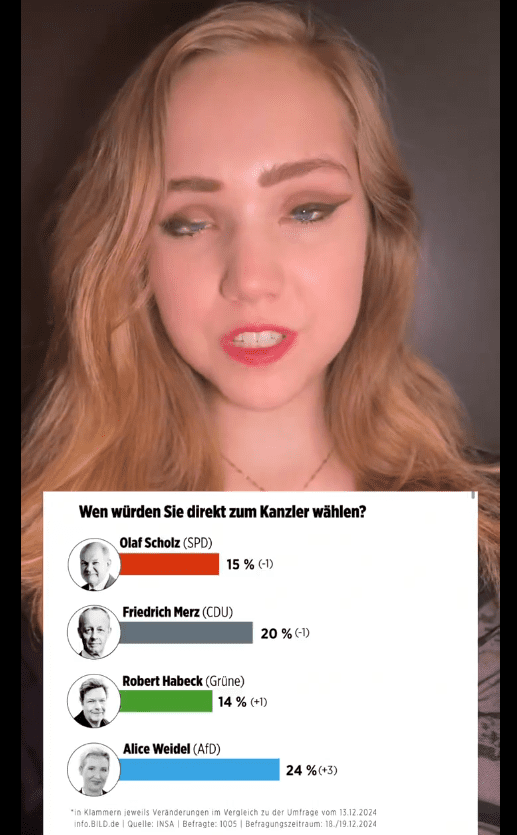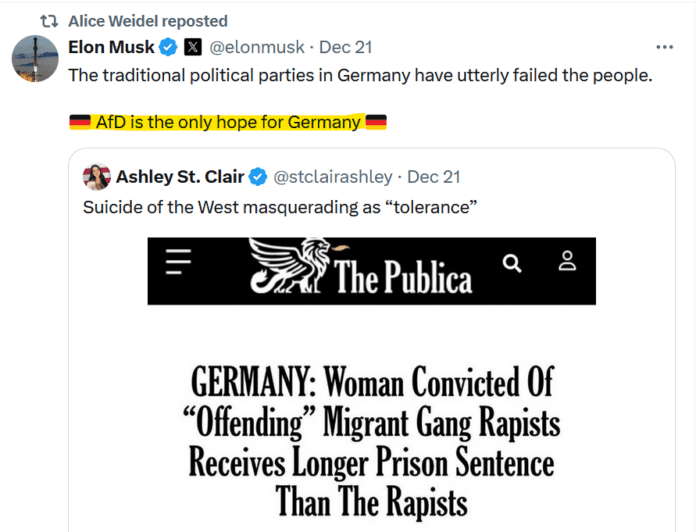In a bold display of his increasingly direct involvement in geopolitics, Elon Musk has once again harnessed his social media platform X to amplify controversial political figures and disrupt global narratives. The latest example is his endorsement of Germany’s far-right Alternative für Deutschland (AfD) party, led by Alice Weidel. With Germany’s federal elections looming, Musk’s public praise and algorithmic favoritism have propelled Weidel to unprecedented prominence, positioning the AfD as a potential electoral powerhouse.
A Platform for Political Power Plays

The Federal Office for the Protection of the Constitution (BfV), Germany’s domestic intelligence agency, has labeled the AfD as a suspected right-wing extremist organization. Despite this designation, Musk’s endorsement of Weidel’s AfD has dramatically shifted the political landscape. Analysts now estimate that the AfD could secure over 30% of the vote, making it Germany’s strongest party. Weidel, who currently tops the national politician rankings, owes much of this surge to Musk’s platform, which has granted her direct access to millions of followers and amplified her messaging through its recommendation algorithms.
Musk’s support extends beyond Germany. In recent months, he has used X to bolster Italian Prime Minister Giorgia Meloni, whose hardline nationalist policies align with his increasingly libertarian worldview. By granting visibility to figures who challenge the status quo of global liberal democracy, Musk is positioning X as a counterweight to what he perceives as the dominance of left-wing media.
Redefining Media Influence
Musk’s vision for X transcends social networking. Under his leadership, the platform has evolved into a powerful policy-making tool, heavily populated by independent journalists and influential commentators. Former Fox News anchor Tucker Carlson now broadcasts exclusively on X, delivering his signature brand of populist, anti-establishment commentary. Megyn Kelly, another prominent media personality, frequently uses the platform to challenge mainstream narratives. Podcasting giants like Joe Rogan and Lex Fridman further amplify X’s reach, creating a content ecosystem that caters to millions of users seeking alternatives to traditional media outlets.
A Geopolitical Counterbalance
Musk’s political interventions are part of a broader strategy to redefine global discourse. By elevating figures like Weidel and Meloni, he is reshaping national narratives and encouraging anti-establishment movements. Critics argue that Musk’s actions undermine democratic institutions and embolden extremist ideologies. Supporters, however, see him as a champion of free speech and a disruptor of entrenched power structures.
Musk’s approach is not without controversy. Political observers have raised concerns about the ethical implications of a tech billionaire leveraging his platform for political ends. German officials, in particular, have expressed unease over X’s role in the country’s political dynamics. “Musk’s influence on German elections is unprecedented,” said Dr. Klaus-Dieter Frankenberger, a senior political analyst. “It’s a new form of interference, not from a nation-state but from a corporate entity.”
The Future of X as a Political Weapon
As Musk continues to expand his influence, X is becoming a cornerstone of his geopolitical ambitions. His platform’s global reach, coupled with its unregulated content ecosystem, offers unparalleled opportunities for shaping public opinion. Whether through endorsements of nationalist leaders, promotion of controversial policies, or fostering debate among influential voices, Musk is using X to challenge the global status quo.
This evolving dynamic underscores the growing role of tech platforms in shaping international politics. With Musk at the helm, X is no longer just a social media platform—it is a global power broker, a megaphone for dissent, and a harbinger of a new era in political communication.





